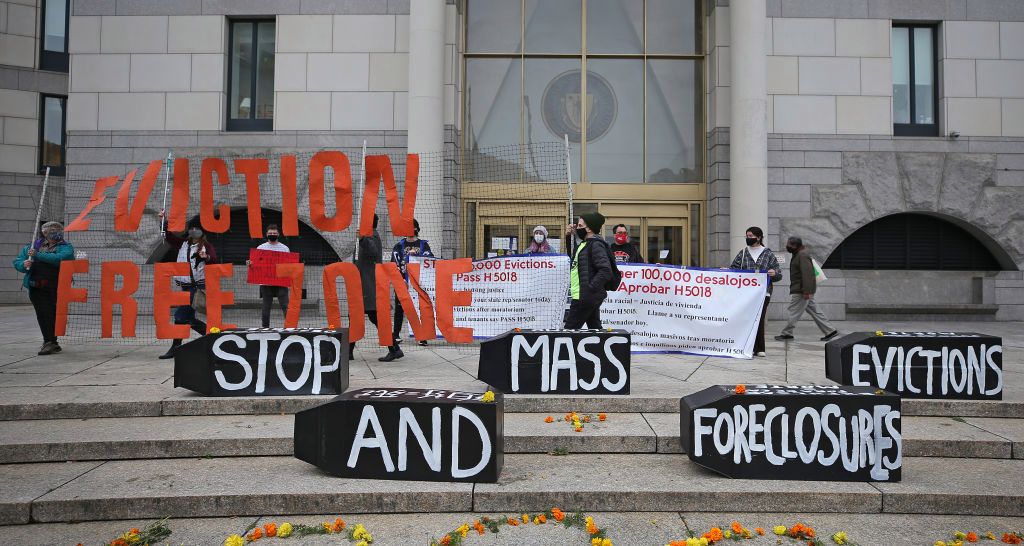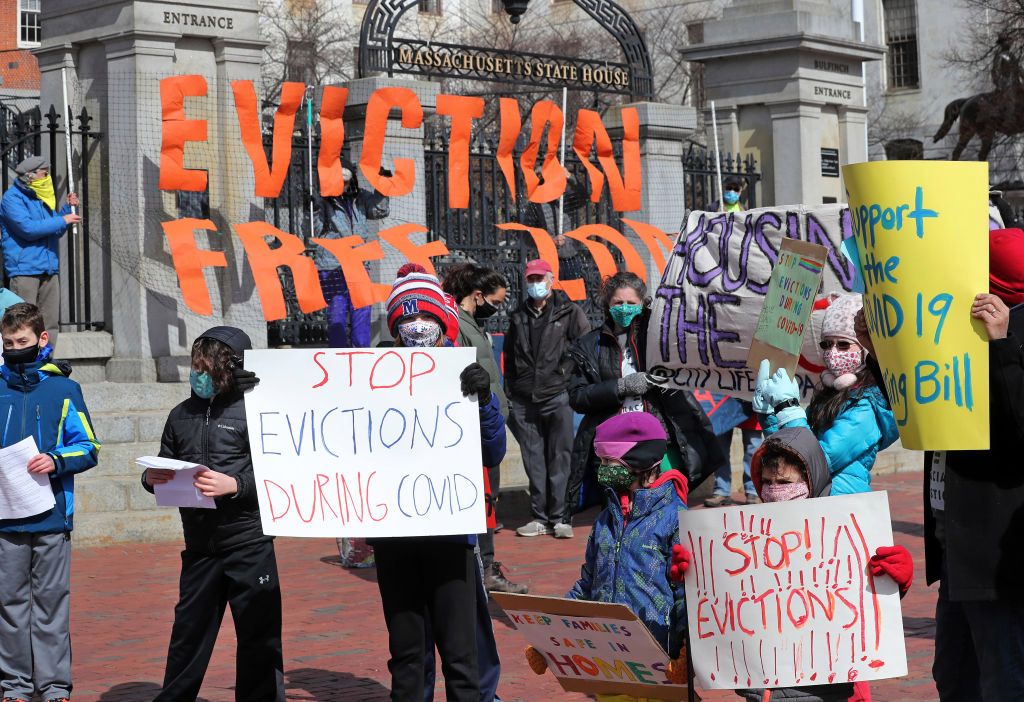
Source: Boston Globe / Getty
The national lawmakers who are duly elected by taxpayers have apparently decided it’s more important to adjourn Congress for the summer and go on vacation than it is to work on behalf of their constituents who may be on the verge of homelessness as the federal eviction moratorium expires this weekend.
The House adjourned at 6:11 pm until Tuesday, August 3, 2021 when the House will meet at 10 am in a Pro Forma Session (no recorded votes)
— Democratic Cloakroom (@DemCloakroom) July 30, 2021
At least, that’s what the message appeared to be after President Joe Biden claimed at the eleventh hour that he was powerless to act without Congress intervening. The White House also blamed the Supreme Court, saying “Biden would have strongly supported a decision by the CDC to further extend this eviction moratorium to protect renters at this moment of heightened vulnerability.”
Biden called in vain for “Congress to extend the eviction moratorium to protect such vulnerable renters and their families without delay.” But members of Congress, especially Democrats, took umbrage at what they described as Biden passing the buck to them.
Freshman Missouri Rep. Cori Bush was seemingly one of the few members of Congress taking the expiring eviction moratorium seriously. A weary-looking Bush on Friday night called out her “Democratic colleagues” for choosing “to go on vacation early today rather than staying to vote to keep people in their homes. She tweeted that she planned to sleep outside the Capitol overnight because “We’ve still got work to do.”
Many of my Democratic colleagues chose to go on vacation early today rather than staying to vote to keep people in their homes.
I’ll be sleeping outside the Capitol tonight. We’ve still got work to do. pic.twitter.com/9l52lWBM73
— Cori Bush (@CoriBush) July 31, 2021
Bush also tweeted a copy of a letter she said she sent to her Congressional colleagues on Friday explaining that evictions are personal for her. Writing that she has been evicted three times in her life, Bush appealed to Congress by explaining that she won’t “stand by while millions of people are vulnerable to experiencing the same trauma that I did.
We need more people in Congress for whom policy is personal. #EvictionMoratorium https://t.co/VAL1viKuAq
— Mondaire Jones (@MondaireJones) July 30, 2021
As many as 15 million people have rent that is past due, possibly totaling up to $70 billion in unpaid rent around the country. That makes them prime candidates for evictions.
A bill was introduced on Thursday to extend the moratorium, but it stalled immediately. It was unclear why lawmakers didn’t act sooner even though it was no secret that the moratorium was expiring Saturday night.
The Supreme Court decided only last month to extend the moratorium through July, with Justice Brett Kavanaugh vowing to oppose any further efforts to extend it.

Source: Boston Globe / Getty
Democratic members of Congress voiced support for ratifying the moratorium, which would have given Biden the power to impose an extension. But without the support of a certain number of Republicans, extending the moratorium is impossible.
CNBC reported that about 350,000 evictions were initiated but stopped during the pandemic because of the moratorium. But because they has previously begun, they are the most likely to be fast-tracked and among the first evictions as August begins.
Biden encouraged cities and states to use the emergency rental assistance funds set aside in the American Rescue Plan, but that was just $45 billion Congress, $3 billion which had been disbursed as of the end of last month, showing that the money is not going to its intended targets.
The #EvictionMoratorium ends Saturday. There is help. Share information and help people apply for rental assistance. pic.twitter.com/cj6iFMyGJX
— JoyceProbstMacAlpine (@joyluc33) July 29, 2021
“It’s horrifying,” Emily Benfer, a visiting professor of law and public health at Wake Forest University and the chair of the American Bar Association’s Task Force Committee on Eviction, told CNBC. She suggested there is no excuse for the U.S. to be in this position considering evictions have been a concern since the beginning of the pandemic.
“Cities and states, over a year ago, were facing heightened eviction risk and had the opportunities to create this infrastructure and the lack of attention and robust intervention has led to this moment where they’re unprepared to prevent the eviction surge,” Benfer said.
She predicted that those affected the most by the evictions will be “Black families, mothers and children.”
Benfer is correct.
Data derived from a Feb. 3-15 U.S. Census Pulse study showed that “30% of Black families reported not being caught up on rent or mortgage payments, vs. 17% of all families.”
Forty percent of Black families said at the time that they were unsure if they would be able to make their next payment on time, in comparison to 24% of all families. In addition, “50% of Black families reported that they were somewhat or very likely to face eviction or foreclosure in the next two months, vs 36% of all families,” according to the study.
The threat of homelessness is pervasive for Black families who are dealing with two pandemics at once — racism and COVID-19.
This is America.
SEE ALSO:
Here’s Why Holding Off Evictions And Foreclosures Isn’t Enough For Black People During COVID-19
If Black Media Doesn’t Tell The Truth About This Nation, It Won’t Be Told
[ione_media_gallery id=”3848058″ overlay=”true”]
window.addEventListener(‘interaction’, function () {
setTimeout(function () {
var s = document.createElement(‘script’), el = document.getElementsByTagName(‘script’)[ 0 ];
s.async = true;
s.src = ‘https://platform.twitter.com/widgets.js’;
el.parentNode.insertBefore(s, el);
}, 1000)
});
